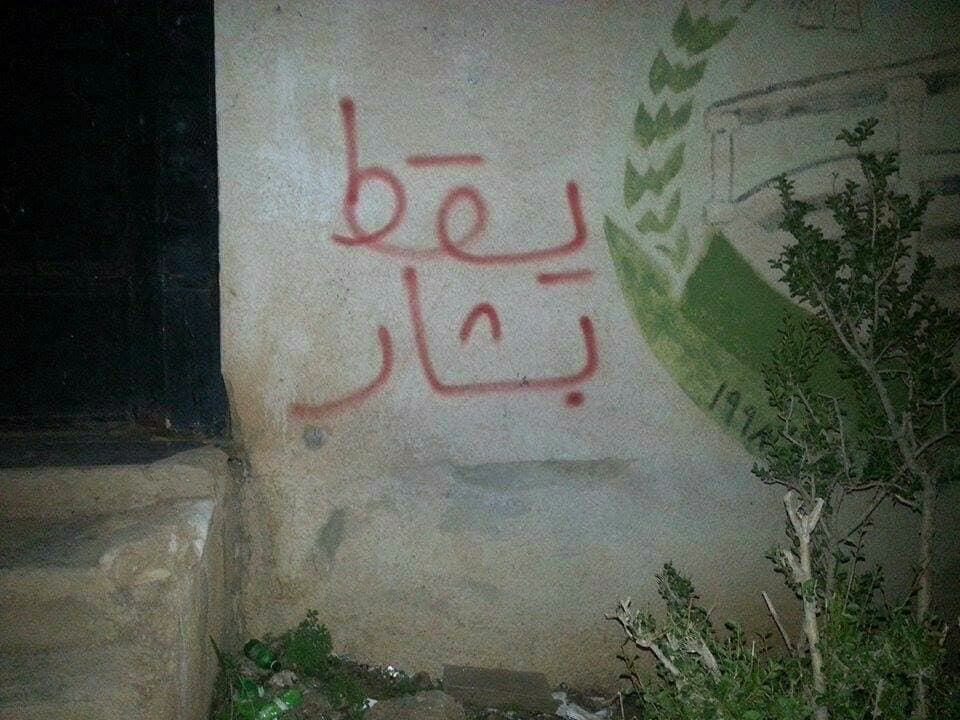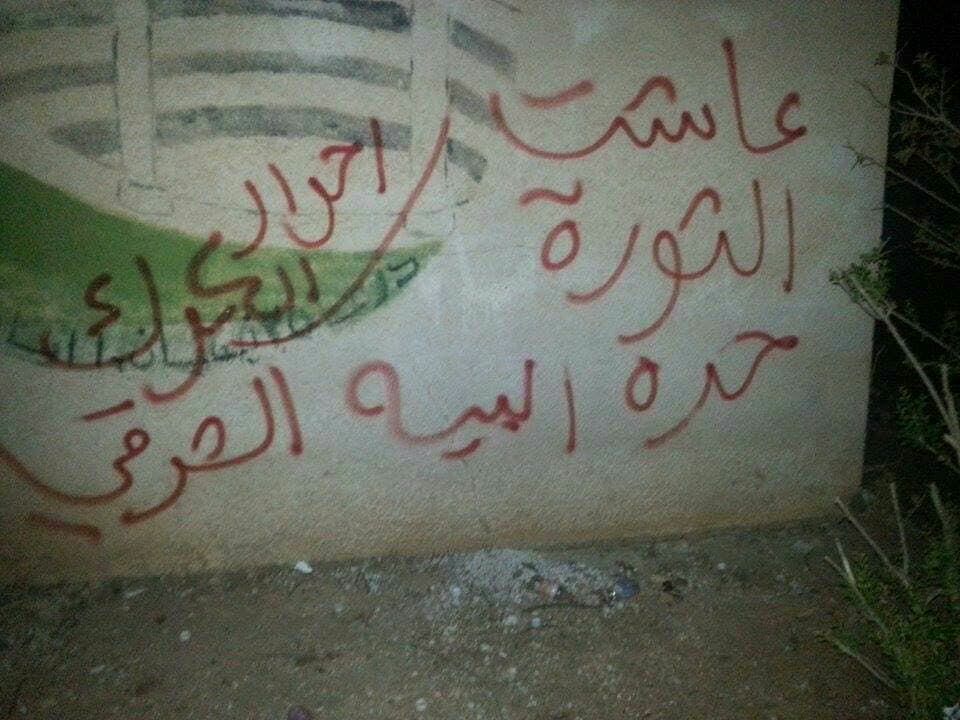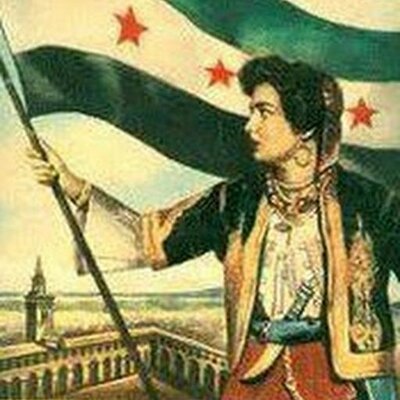
'The promotion of the idea of a Syrian régime that defends its Christians is carefully stage-managed. Any visit from an academic, MP, or lobbyist, with the potential to involve Syria's Christian groups, is always seized upon and exploited in news reports. Soon after the Ba'ath party came to power, its relationship with the Sunni majority turned sour. Very quickly, the régime targeted the Muslim Brotherhood, one of the only forces which could claim to constitute any sort of opposition. But it was the assumption of power by Hafez al-Assad in 1970, and the Syrian invasion of Lebanon in 1976, that lit the touch paper. Confrontation escalated: there were terrorist attacks and murders on one side, and arrests and torture on the other. Then, in 1979, a sectarian offshoot of the Brotherhood launched an attack against the Aleppo artillery academy. Eight-three cadets, all Alawis, were killed. The régime's revenge was ruthless. A full-scale civil war followed, which was little known in the West since no media were able to cover it. It ended with the crushing of the city of Hama in 1982. Tens of thousands of people were killed. Thousands more were deported to the Palmyra prison in the middle of the eastern desert, which effectively became an extermination camp. This massacre - which sparked little international protest - brought the régime three decades of relative internal peace, at a high price. The régime sent a number of Christian officers to the front line to crush the Hama insurgency. This was a Machiavellian way of sealing a blood pact with the Christian community. The message was clear: if one day the Sunni are in a position to take their revenge, they will avenge themselves on you as much as on us. Your fate now depends on our régime's survival.'
[Chapter 1, Marketing Secularism, pp 2-3]
'In reality, the régime fed sectarian fears. It did, after all, claim that when the revolution began, that the demonstrators were chanting: "Christians to Beirut, Alawis to the grave!" ("Massihiyin bi-Beirut, Alawiyin bi-Tabut!").
I have not found any confirmation of this claim. Yet many believed the threat was real, and from the start of the uprising, it contributed to inter-communal tension. Also early on, the régime distributed weapons, particularly in the Alawi coastal villages, and the Druze suburbs of Damascus, and these deliveries were accompanied by scaremongering about entirely invented threats, said to originate in neighbouring Sunni villages.
Yassin al-Haj Saleh is an old communist militant from Raqqa, long opposed to the régime. These Machiavellian tactics do not surprise him in the least. In a chilling article, "The Murder Industry in Syria", he describes Assad's methods of creating two walls of fear: fear of oppression by the régime and the fear of potential informants: "Before the outbreak of the revolution, we knew the régime depended on two Orwellian strategic systems: the fear complex, whose aim is to prevent things being called by their proper names, and the lie complex, whose function is to call things by other names than their own. Both ensure that Syrians are cut off from the real conditions of their lives, and that they can neither describe nor control them." '
[pp 6-7]
'The number of its victims give the lie to the régime's alleged "protection of minorities". Photographs secretly sent out by someone using the codename "Caesar", who was employed for years by the military police in Damascus, photographing people killed. More than two years after the revolution began, he managed to send 55,000 pictures out of the country, documenting the fate of nearly 11,000 victims. These pictures prove in disturbing detail that the régime has indeed attacked minorities. Many Christians could be identified by the fact that they were uncircumcised and by tattoos in the shape of the cross. Other victims bore religious markings indicating they were Shia, and others even had the name or face of Bashar al-Assad on their bodies.
Alawi and Christian revolutionaries I met in Lattakia at the start of the uprising told me: "God help us if the Mukhabarat [the dreaded intelligence services] catch us because they take it out on people like us in particular, because they consider us traitors to our community." '
[pp 9-10]
'Ayman Abdel-Nour: "The Syrian Christian clergy has literally been bought wholesale by the régime. In the photos of every official event, there is always a representative of each religious denomination around the government representative. The régime has turned it into a competition between the representatives of each Christian church, who fight each other for the privilege of being in the photo. And there is also direct corruption, with cash handouts." '
[pp 10-11]
********************************
'
From the summer of 2011, detainees held for their alleged jihadi activities began to be released. In January 2014, Nawaf al-Fares, a former chief in Military Intelligence (Amn al-Askari), revealed that, "the régime did not just open the door to the prisons and let these extremists out, it facilitated them in their work, by helping them set up armed units."
This four-month release programme was supervised by the Directorate of General security and lasted until October 2011. The prisoners were carefully selected. Those with a known commitment to human rights and democracy remained in jail, while the radicals went free. One of the most famous was Zahran Alloush, who founded the most powerful anti-Assad group in the Damascus area as soon as he was freed and became well known for his violently anti-Shia rhetoric.'
[Chapter 2, Birth of the Jihadists, pp 16-17]
'Wherever ISIS fighters advanced, they drove back moderate groups, forcing them from their hard-won territories. ISIS is like a cuckoo, plundering the nest the revolutionaries fought so hard for. Almost all of the territory ruled by ISIS was previously occupied by other groups. ISIS has on the whole been content with seizing teritory only after others have taken it.
As a result, ISIS has rarely launched frontal attacks on the régime, seizing the Menagh airbase, capturing Division 17 in Raqqa, and small-scale battles elsewhere being the complete list. Baghdadi's men have not tried to confront the régime. Quite the reverse: they have concentrated their offensives on revolutionaries and the Kurds, with whom ISIS competes for territory.'
[p19]
'ISIS has an adversarial relationship with other jihadi movements such as Jabhat al-Nusra and Ahrar ash-Sham. The accusations of betrayal, even of collaboration with the régime, are some of the main charges made against ISIS, even more than its extremist stance and violent methods.'
[p20]
'At the end of 2013, the moderate groups, lost patience when ISIS took the border town of Azaz in the country's north-west. In early January 2014, a coalition was formed (mainly between the Islamic Front and the Northern Storm Brigade), in order to dislodge ISIS from its north-western strongholds. The coalition also had the support of several countries, notably the United States, Turkey, and several powerful Gulf states.'
[p20]
'Jabhat al-Nusra, an al-Qaeda franchise, nevertheless enjoys real support in Sunni areas. This is the result of its genuine and effective fight against the régime. In the parts of Syria it controls, the population appreciates the fact that it plunders resources less than other armed groups, including the régime's militias. Sunnis also tend to consider Jabhat al-Nusra to be effective in protecting them against the régime's abuses.
Abu Mohammad al-Joulani sought recognition in the summer of 2014, and asked the United Nations to remove his group from the list of terrorist organisations. The group offered to withdraw from al-Qaeda in exchange for this, but this did not seem to catch the attention of the great powers.'
[p22]
'Thomas Pierret: "The military advantages of alliance with Assad are insignificant compared to the political drawbacks. Backing Assad and abandoning the rebels is equivalent to making ISIS the régime's sole credible opponent, and therefore means throwing a large proportion of Sunnis, even the moderate ones, into its arms." '
[p24]
***********************************
'The "House of Assad" quickly became "Assad, Inc." it met in the winter of 2005, shortly after the Ba'ath party's tenth congress, amid the colonnades of a luxury hotel in the ancient Roman city of Palmyra in the eastern desert. In this luxurious setting, the régime's favoured businessmen agreed to divide up the country's entire wealth. The result of this "Yalta of privatisations was the creation of two holding companies, the Cham group, run by Rami Makhlouf, the president's cousin, and the Souria group. From then on, these groups split the country between them, tapping its wealth through participation in the government and taking public contracts.'
[Chapter 3, Money Talks, pp 27-28]
'Ziad Majed: "There is a class dimension to the Syrian revolution. Apart from the students, intellectuals and activists, who played an important part in the early months, this revolution is mostly about the poor country folk, simple peasants for whom some of the new Syrian middle class have little sympathy. The new rich prefer to identify with the régime's "westernised" appearance, and the régime in addition protects its "deals", interests and businesses. There is also a strong element of social racism. People only want to see others who look "like us". People shut themselves off in a kind of bubble, and despise workers, vegetable sellers, cleaning ladies and all those who support them." '
[p30]
'Syrian journalist Hala Kodmani describes how "a spontaneous but very well organised movement sprang up as soon as there were free zones: the city's prominent citizens came together and created local councils. The people organised food supplies, schooling, hospitals and courts. This experiment failed for two reasons: first of all the bombings by the régime, which particularly targeted civilians - especially schools and hospitals - and secondly because of the Islamic fundamentalists." '
[p31]
'The state soon had difficulty paying for the various militias and informal militiamen called shabihha it used to carry out repression (often ex-criminals in charge of the intelligence services' dirty work). The régime's henchmen were therefore authorised to "live off the land". When subduing a neighbourhood or retaking a village from the revolutionaries, they would not only attack the locals, but also loot and plunder.'
[p31]
'Hamit Bozarslan: "In Syria, we are witnessing an insane disintegration of the state, to the point where it is turning into a militia. We are watching a mafia state destroying its own society to live off its very destruction." '
[p32]
'The régime does not have a monopoly on theft and looting. Yassin al-Haj Saleh describes how, "Armed groups have stripped the civilian population. You need them for everything - even just to eat. They want to control people. Among them are groups that are more open-minded, but their resources are more limited and they are weaker than the radical groups." '
[p32]
'ISIS and the Syrian régime are happy to do business together when it suits them. In January 2014, Ruth Sherlock, the Daily Telegraph's Middle East correspondent, revealed the murky secrets of oil trafficking between these two "enemies". Crude oil extracted in government-controlled areas was being transported via pipelines to areas held by ISIS and vice versa.'
[p36]
'The terrible irony pf these airstrikes is that people suffer more in the areas no longer under government control, whether they are held by the Free Syrian Army, ISIS or another rebel group. The régime is able to maintain the population's standard of living through substantial financial support from Iran and Russia. Quite the opposite occurs in areas freed from its yoke, with the partial exception of Kurdish regions.'
[pp 37-38]
*******************************************
'When it was founded in spring 2012, when the Homs neighbourhood of Baba Amr was under siege from the Syrian army, Jabhat al-Nusra initially enjoyed the esteem of its countrymen. Fairly well-organised, honest, effective in battle, with a limited use of "martyrdom operations", its members were, in the eyes of Syrians, an effective bulwark against the régime, even though most did not share their extremely conservative political, religious and social views. It did not baulk at taking on the army and intervening when the latter attacked. It was always careful to distinguish between civilian and military targets.
The régime continued to push the radicalisation of the conflict, contributing both to Jabhat al-Nusra's increasing sectarianism, and the creation of ISIS. This is why Jabhat al-Nusra, which had previously been selective in its choice of targets, changed tack in summer 2013, after the chemical attack on the Ghouta. The movement decided to be more sectarian by attacking "Alawi targets".
One of Jabat al-Nusra's priorities is to avoid fitna, an internecine struggle between Muslims.'
[Chapter 4, A Self-fulfilling Prophecy, pp 42-45]
'It seems obvious to everyone I've met in Syria since the revolution began that the country needs international assistance to finish off Assad's dictatorship. But it has taken a long time for Syrians to realise that this assistance will never come, and that realisation has been painful.
There have been innumerable calls for help from revolutionary groups. In October 2011, a request for a no-fly zone. In December 2011, a request for a humanitarian buffer zone, in which displaced people could seek protection. In January 2012, there was a request for clear support for the Free Syrian Army. In March 2012, a request for an international military intervention to put an end to massacres. In August 2012, a request for anti-aircraft weaponry, and so on.
The most shameful inaction followed the chemical bombing of the Ghouta in August 2013, which resulted in 1400 deaths. Initially the régime panicked. Observers in Damascus thought the upper echelons of the régime were preparing to flee, convinced that Western intervention was imminent.
But on the contrary, the absence of reaction was finally taken as giving the régime carte blanche; it realised the West would never do anything. Assad immediately intensified the brutality of his attacks, and insidiously reintroduced chlorine, his chemical weapon of choice.
Historian and publisher Farouk Mardam Bey, agrees that "since the lack of ant Western reaction to the chemical bombing of the Ghouta, régime bombing has doubled in ferocity and now targets the civilian population much more viciously to cause the maximum number of civilian casualties. We have seen the advance of the Syrian army on the ground, with militia support, while watching a media offensive intent on conveying the message: 'it's either Daesh [ISIS]. or the régime.' " '
[pp 46-47]













